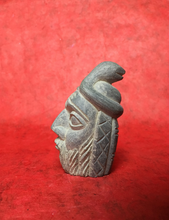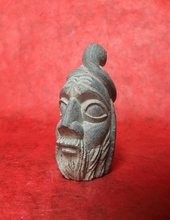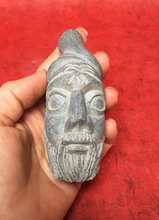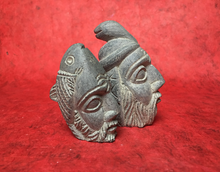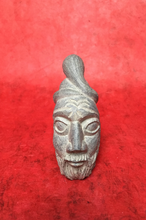
Asclepius or Hepius, rare kind Anatolian Statue. God of good health and medicine with serpent. The serpent on his head representing the healing, medicine, health and medical arts.
Statue from grayish authentic serpentine stone, which called 'lucky stone' in Anatolia. Style of artisan and his shaping of the stone is unique. All hand made without any mechanic tools.
We found this rare interpretation of serpent god in an ancient city of Anatolia. Only one in Axis Mundi. There can be cracks and veins on all statues because of the natural type of stones.
Asclepius or Hepius is a hero and god of medicine in ancient Greek religion and mythology. He is the son of Apollo and Coronis, or Arsinoe, or of Apollo alone. Asclepius represents the healing aspect of the medical arts; his daughters are Hygieia ("Hygiene", the goddess of cleanliness), Iaso (the goddess of recuperation from illness), Aceso (the goddess of the healing process), Aegle (the goddess of good health) and Panacea (the goddess of universal remedy). He has several sons as well. He was associated with the Roman/Etruscan god Vediovis and the Egyptian Imhotep. He shared with Apollo the epithet Paean ("the Healer"). The rod of Asclepius, a snake-entwined staff, (similar to the caduceus) remains a symbol of medicine today. Those physicians and attendants who served this god were known as the Therapeutae of Asclepius.
Snake God Asclepius, Aesculapius Bust, Babylonian Serpent God, God of Medicine, Magician Altar Statue, Hand carved serpentine stone.
Magician altar statue.
Statue from grayish authentic serpentine stone, which called 'lucky stone' in Anatolia. Style of artisan and his shaping of the stone is unique. All hand made without any mechanic tools.
We found this rare interpretation of serpent god in an ancient city of Anatolia. Only one in Axis Mundi. There can be cracks and veins on all statues because of the natural type of stones.
Asclepius or Hepius is a hero and god of medicine in ancient Greek religion and mythology. He is the son of Apollo and Coronis, or Arsinoe, or of Apollo alone. Asclepius represents the healing aspect of the medical arts; his daughters are Hygieia ("Hygiene", the goddess of cleanliness), Iaso (the goddess of recuperation from illness), Aceso (the goddess of the healing process), Aegle (the goddess of good health) and Panacea (the goddess of universal remedy). He has several sons as well. He was associated with the Roman/Etruscan god Vediovis and the Egyptian Imhotep. He shared with Apollo the epithet Paean ("the Healer"). The rod of Asclepius, a snake-entwined staff, (similar to the caduceus) remains a symbol of medicine today. Those physicians and attendants who served this god were known as the Therapeutae of Asclepius.
Snake God Asclepius, Aesculapius Bust, Babylonian Serpent God, God of Medicine, Magician Altar Statue, Hand carved serpentine stone.
Magician altar statue.





